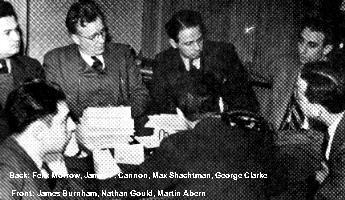Tuesday, October 31, 2006
Stalinophobia. posted by Richard Seymour

We in the antiwar movement are used to attacks implying guilt by association. One of the odder tactics has been the demand that the left should disaffiliate from those who still think that the Stalinist states have or had something to recommend them. In my view, people who think the Soviet Union was on balance a good thing with some horrible excesses or that Cuba is a workers' state are mistaken, not monsters. The attacks by former lefties turned liberal, such as Nick Cohen, on people like Andrew Murray and George Galloway have a very strange and particular pedigree.
This emerged during the 1940 split between the Trotsky/Cannon faction in the SWP and the Shachtman/Burnham faction, which argued that the Soviet Union was a new form of class society ('bureaucratic collectivism'). Burnham moved very quickly to the right on the basis of this position, writing in 1945 that Stalin was "Lenin’s Heir" (a position Orwell was quite scathing about), that socialism meant slavery, and that Soviet power was expansive and conquering. He later added that "the only alternative to the Communist World Empire is an American Empire". That quote I found in Christopher Hitchens, “How Neo-Conservatives Perish”, For The Sake of Argument, (Verso, London & New York, 1993). Ironically, Hitchens argues in the same piece that the notion of totalitarianism was one used by neoconservatives to give "watery notions the strength of concrete" and "petrify" political opponents. This is ironic, but not ironic enough, because Hitchens likes to refer to "totalitarianism" of a "theocratic" character these days.
Shachtman remained a Leninist until the mid-1950s, but had already argued in the late 1940s that the Stalinist parties were germinal ruling classes, more dangerous to the working class than capitalists, an extreme case of what Irving Howe characterised as "Stalinophobia". (See Alan M Wald, The New York Intellectuals, University of North Carolina Press, 1987). This missed the way in which parties who were organisationally subordinated to the priorities of the Soviet Union could escape that bondage and critically engage with it. And if this was so for parties, it has certainly been so for individuals. Indeed, the essence of the difference between fascism and communism is expressed in the fact that there never was a Trotsky for the fascist movement. That mistaken position would lead Shachtman to support the US in Vietnam and back Richard Nixon, of course. His perspective on the Korean war had also been curious: he was against disruptive strikes during it, and while he felt that the US should withdraw its troops, the British should stay because they had a Labour government in power. But the more immediate and urgent problem was that this dovetailed with the coming McCarthyite campaign which would insist that communists be driven out of the trade unions, a crucial development in the de-radicalisation of the American working class. It disarmed the section of the far left that identified with Shachtman, and also later ensured that some his followers became political supporters of or office workers for people like Henry Jackson and Jeane Kirkpatrick. This wasn't so for people like Hal Draper, whose followers - though burdened with the search for a 'Third Force' (straight out of the lexicon of US imperial strategy - check out Graham Greene's The Quiet American for an vivid illustration of what this meant), in fact remained critical of US imperialism and in fact became strong supporters of the Sandinistas even though they could as plausibly be called 'bureaucratic revolutionaries' as the NLF. However, given the other trend, it isn't really surprising that one of the many tactics of left-imperialists is to appeal to the left critique of Stalinism. Those pro-imperialists who were educated in the Trotskyist critique of Stalinist counterrevolution do at least have a tradition to draw on, even if it isn't a particularly august one. And they also have the advantage of knowing that their critique of renegades that would soon become auto-critique has its precedents too.










